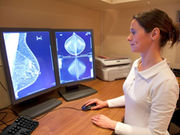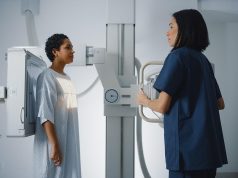Lower cancer yield compared to mammography alone for women with, without personal history of cancer
WEDNESDAY, Feb. 14, 2018 (HealthDay News) — Women undergoing screening breast magnetic resonance imaging (MRI) have higher biopsy rates and significantly lower cancer yield findings compared with screening mammography alone, regardless of personal history of breast cancer (PHBC), according to a study published online Feb. 12 in JAMA Internal Medicine.
Diana S.M. Buist, Ph.D., M.P.H., from the Kaiser Permanente Washington Health Research Institute in Seattle, and colleagues conducted an observational cohort study of six Breast Cancer Surveillance Consortium registries. Data were included for a sample of 812,164 women undergoing a total of 2,048,994 digital mammography and/or breast MRI screening episodes from 2003 through 2013. Outcomes were stratified by PHBC.
The researchers found that for women with PHBC, age-adjusted core and surgical biopsy rates were doubled after MRI versus mammography (57.1 versus 23.6 per 1,000 episodes). The differences were even larger for women without PHBC (84.7 and 14.9 per 1,000 episodes, respectively). In women with PHBC, the ductal carcinoma in situ and invasive biopsy yield was significantly higher after mammography versus MRI episodes (404.6 versus 267.6 per 1,000 episodes); for women without PHBC, the yield was nonsignificantly higher (279.3 versus 214.6 per 1,000 episodes). Regardless of PHBC, high-risk benign lesions were more commonly identified after MRI.
“Further work is needed to identify women who will benefit from screening MRI to ensure an acceptable benefit-to-harm ratio,” the authors write.
Copyright © 2018 HealthDay. All rights reserved.








